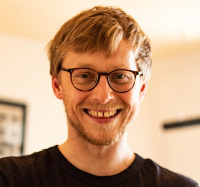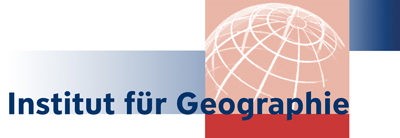
Dr. Valentin Meilinger
Lehrstuhl für Geographie (Kulturgeographie und Gesellschafts-/Umweltforschung)
Wissenschaftliche Mitarbeitende
Adresse
Zimmer: 02.229, Geschoss: 02
Kontakt
Qualifications
2023
Doctorate in Spatial Planning, Utrecht University, The Netherlands
2017
MA in Human Geography, Goethe-University Frankfurt am Main, Germany
2014
BA in Human Geography, Goethe-University Frankfurt am Main, Germany
Career
From June 2025
Postdoctoral Research Fellow, Society-Environment Research Group, Department of Geography, FAU Erlangen-Nürnberg
2021-2025
Research Associate, German Environment Agency, Competence Center for Climate Impacts and Adaptation, Dessau-Roßlau, Germany
2020-2021
Doctoral Researcher, Department of Human Geography and Spatial Planning, Utrecht University, The Netherlands
2019-2020
Visiting Doctoral Researcher, Faculty of Architecture and Urbanism, Federal University of Rio de Janeiro, Brazil
2019
Visiting Graduate Researcher, California Center for Sustainable Communities at UCLA, University of California, Los Angeles, USA
2018
Visiting Graduate Researcher, California Center for Sustainable Communities at UCLA, University of California, Los Angeles, USA
2017-2020
Doctoral Scholarship, Hans-Böckler-Foundation
2014-2016
Research Assistant, Technical University Darmstadt, Chair of Spatial and Infrastructure Planning, Prof. Dr. Jochen Monstadt, Darmstadt, Germany
Leadership Roles
2017-2019
Member of Ph.D. Council, Faculty of Geosciences, Utrecht University, The Netherlands
2015-2016
Member of Doctoral Dissertation Council, Institute of Human Geography, Goethe-University, Frankfurt am Main, Germany
2014-2016
Student Advocate, Graduate program “Geographies of Globalization: Metropolises and Markets” Institute of Human Geography, Goethe-University, Frankfurt am Main, Germany
(i) Technopolitics of urban infrastructures
One key focus of my research investigates how urban infrastructures—in particular, water and wastewater systems—function as arenas of political contestation over urban nature and space. Drawing on debates in Urban Infrastructure Studies and Science and Technology Studies (STS), I approach infrastructures as relational configurations of artifacts and practices that shaped by, but also shape, wider political processes. Infrastructures constitute sites of technopolitics that reflect, but also generate novel power dynamics in urban space, while influencing the evolution of infrastructures in contested and often unpredictable ways. This perspective challenges modernist paradigms of technology and planning in governing urban nature and space that assume clearly defined problems, technology as a neutral instrument, and the primacy of expert knowledge. To understand the technopolitical dynamics of urban infrastructures, in my doctoral research, I have studied ongoing efforts to realize ideas of circular water management to transform water and wastewater infrastructures in Los Angeles, USA, in the face of recurring droughts exacerbated by climate change and ongoing water pollution challenges. This research shows how efforts to implement urban circular water management give rise to powerful technopolitical regimes shaped by existing infrastructural paths. These regimes lead to the ongoing hybridization of urban water systems, where old and new technologies, practices, and institutions become unevenly entangled.
(ii) Urban Political Ecology
A second focus of my research is exploring the shifting meanings and politics of urban environments. My work engages with debates within Urban Political Ecology (UPE), drawing on the concept of the urban metabolism as a historical-materialist frameworks to examine the historical production of urban nature and its co-evolution with infrastructure development. In particular, I aim to pluralize and expand conceptualizations of power and agency in UPE by empirically examining urban infrastructures and integrating insights from STS and Cultural Geography. Central to this effort is the analysis of what I call technological cultures of urban nature as a realm of power and of the (un)making of material-semiotic differences which influences how urban environments become produced and inhabited. This perspective emphasizes how epistemologies, discourses, and institutions that grant meaning to urban nature and space form, and become contested, around technological artifacts, and how these meanings become relevant for urban environmental politics. My empirical work traces how place-based technological cultures of urban nature that become articulated through specific infrastructural practices shape how different resource logics, consumption norms, urban landscapes, and forms of environmental responsibility materialize through processes on infrastructural change. Within a German-speaking research network, we are currently advancing conceptualizations of the climate crisis as a critical force shaping the urban metabolism, in order to push forward debates within UPE.
(iii) Urban dimensions of planetary change and critique of system-based concepts
Another key line of my research is to investigate how climate change and transgressed planetary boundaries act not as passive backdrops but as active forces reshaping how urban nature and infrastructure become known, experienced, and politicized. This research builds on my doctoral work on shifting water infrastructures in Los Angeles and has evolved through an in-house research project at the German Environment Agency, where I was responsible for a working package examining the politics of implementing the sponge city concept as a climate adaptation strategy in German cities.
First, I engage with climate urbanism scholarship which emphasizes climate change as a condition of governing urban environments that plays out differently across local contexts and which problematizes technocratic tendencies in climate adaptation. Second, I explore technopolitical landscapes at the interface of groundwater bodies, urban infrastructures, and urban landscapes as a critical dimension through which we can grasp the environmental politics of what Bruno Latour called the Critical Zone, the thin layer where terrestrial life exists on the planet. This endeavor aims to advance critical urban perspectives within a planetary turn in the social sciences. Third, and most importantly, my research develops a critique of system-based approaches to urban nature, including Circular Cities, Sponge Cities, Planetary Boundaries, and Planetary Health. These approaches promise predictability and control in governing increasingly uncontrollable and health-threatening urban environments societies have co-produced. I examine the ambiguities and uneven political dynamics that emerge when such concepts are translated into practice. Specifically, my research traces how the histories, discourses, epistemologies, and geographies tied to the artifacts in focus of such system-based approaches establish different, and often co-existing versions of future cities—each carrying its own set of environmental politics.
In my current Walter Benjamin postdoctoral project funded by the German Research Foundation, I critically examine an intertwined environmental and public health crisis in Rio de Janeiro, Brazil, linked to water pollution in urban rivers and supply infrastructures. This research offers a critical review of the Planetary Health concept by questioning assumptions around the measurability of health impacts, the relationships between human and non-human health, and the role of science and technology in governing the pollution crisis.
(iv) Urban environmental governance
Finally, my research integrates lessons from STS and UPE into debates on urban environmental governance in order to render those more sensitive to issues of power and socio-ecological difference. First, I draw from and advance research in urban water and sanitation governance that theorizes the political role of scientific paradigms and institutions to explain differences in responses to urban water and sanitation issues. Building on the work of scholars like Karen Bakker, I examine how diverse epistemologies and cultural meanings of water influence the ways in which urban water and wastewater become governed. Second, my work engages with the governance of urban infrastructure and sustainability transitions, with a particular focus on climate adaptation as an emerging policy field. At the German Environment Agency, I used inter- and transdisciplinary methods to identify barriers and opportunities for implementing sponge city strategies in Germany and I proposed policy instruments to support this process. More broadly, my research identifies how urban actors deploy experimental modes of urban transitions governance in order to conduct urban change under climate change. It highlights the need for reconfigured socio-political conditions to effectively address the increasing complexity and uncertainty of urban environmental governance.
Peer-reviewed journal articles
Meilinger, V., & Monstadt, J. (2025). One water in Los Angeles? Contesting the circular city through infrastructural practices. Urban Geography, 1–24, DOI 10.1080/02723638.2025.2456376
Meilinger, V. & J. Monstadt (2023). Infrastructuring gardens: The material politics of outdoor water conservation in Los Angeles, Annals of the American Association of Geographers, 113:1, 206-224, DOI: 10.1080/24694452.2022.2085655.
Meilinger, V. & J. Monstadt (2022). From the sanitary city to the circular city? Technopolitics of wastewater restructuring in Los Angeles, California. International Journal of Urban and Regional Research, 46(2), 182-201. DOI: 10.1111/1468-2427.13014.
Meilinger, V. & J. Monstadt (2022). The material politics of integrated urban stormwater management in Los Angeles, California. Local Environment 27(7): 847-862. DOI: 10.1080/13549839.2022.2078292.
Monstadt, J. & V. Meilinger (2020). Governing suburbia through regionalized land-use planning? Experiences from the Greater Frankfurt Region. Land Use Policy 91 (February). DOI 10.1016/j.landusepol.2019.104300.
Monographies
Meilinger, V. (2023) Sewers, ponds, and gardens: Technology and the politics of circular water flow in Los Angeles. InPlanning. DOI: 10.17418/PHD.2023. 9789062666560
Articles in edited volumes
Meilinger, V. & J. Monstadt (2024). Shaping Suburbanization through integrated land use planning? The case of Greater Frankfurt Rhine-Main. In: P. Hamel (ed) Politics of the periphery: Governing global suburbia. University of Toronto Press.
Other publications (non peer-reviewed)
Becken, K., Conrad, A., Daschkeit, A., DeTroy, S., Dross, M., Eckert, K., Glock, J.-P., Illvonen, O., Mahrenholz, P., Meilinger, V., Schröder, A., Tiefjen, S. & J. Wiehn (2024). Neues Europäisches Bauhaus weiterdenken. RaumPlanung. 229/6-2024.
Meilinger, V., García Soler, N. & A. Vetter (2024). Ziele und Politikinstrumente für klimaresiliente Schwammstädte. Umweltbundesamt.
Schubert, S., Vetter, A., & V. Meilinger (2024). Politische Gestaltung einer ökologischen Stadtplanung. Grüne Dächer für ein gutes Klima. Politische Ökologie. 1/2024.
Schubert, S., Bartke, S., Becken, K., Breitmeier, M., Brozowski, F., DeTroy, S., Grimski, D., Ilvonen, O., Keßler, H., Messner, D., Meilinger, V., von Schlippenbach, U., Schröder, A., Schuberth, J., Hillebrandt, A., Lerm, M., Lützkendorf, T., & C. Reicher (2024). Umwelt und Klima schützen – Wohnraum schaffen – Lebensqualität verbessern. Empfehlungen von UBA und KNBau für einen nachhaltigen Wohnungs- und Städtebau. Umweltbundesamt.
Conrad, A., DeTroy, S.E., Dross, M., Eckert, K., Meilinger, V., & A. Schröder (2022). Advancing the New European Bauhaus: Sustainable mobility and resilient urban spaces for a better quality of life – the AdNEB project. elni Review.
Laranjeira, K., Harrs, J.-A., Dalitz. L., Meilinger, V., & A. Huck (2021). Bestandsaufnahme zur Anpassungsforschung und -praxis in Deutschland. BMBF-Fördermaßnahme. Regionale Informationen zum Klimahandeln.
SoSe 2025:
Seminar ‚Urbane Naturen im Anthropozän‘ (together with Prof. Dr. Sandra Jasper)
MA Kulturgeographie, FAU Erlangen
SoSe 2026:
Seminar ‚Infrastructure, Technopolitics and Urban Change‘
MA Kulturgeographie, FAU Erlangen
